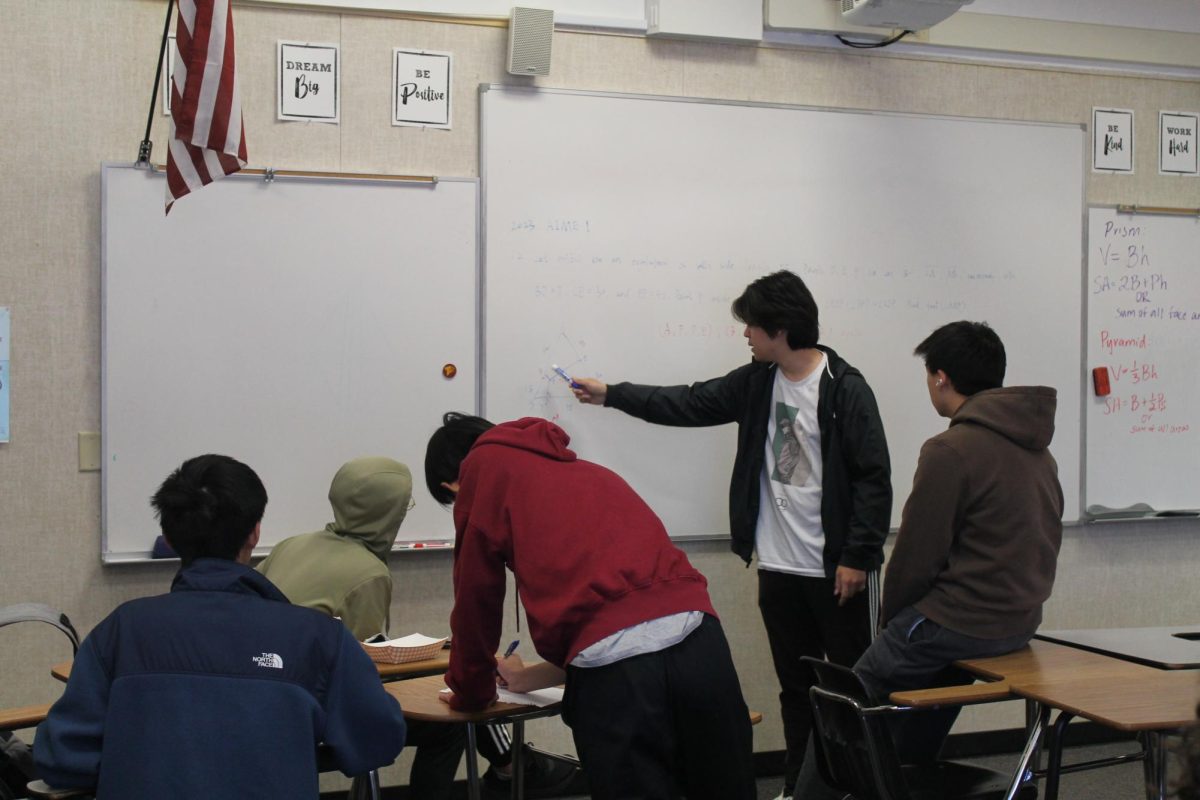Future trends of math instruction led by qualified math teachers
Wiki Article
Everything About Qualified Mathematics Educators: Their Duty in Fostering Trainee Growth and Accomplishment in Mathematics Education And Learning
Qualified mathematics educators are important fit pupils' understanding and admiration of maths. Their deep expertise and reliable training techniques can significantly influence trainee results. These instructors not only pass on mathematical abilities yet additionally foster an inclusive setting that meets varied learning requirements. As they take on ingenious approaches, the concern emerges: exactly how do these techniques specifically improve trainee involvement and achievement in mathematics?The Importance of Professional Mathematics Educators in Education
Although lots of elements add to trainee success in mathematics, the presence of qualified math teachers stands apart as a critical element in fostering reliable understanding atmospheres. Study regularly shows that pupils educated by instructors with solid mathematical backgrounds have a tendency to show higher degrees of understanding and accomplishment. Certified math teachers not only possess a deep understanding of mathematical principles however likewise the pedagogical skills essential to communicate complicated concepts in easily accessible methods. They can determine trainees' specific needs and adapt their training strategies appropriately, advertising inclusivity and interaction. In enhancement, their competence allows them to produce a favorable class ambience that encourages risk-taking and durability in analytical. This encouraging environment fosters a growth attitude among pupils, enhancing their self-confidence and motivation in maths. Generally, certified math instructors play a vital function in shaping trainees' perspectives towards math, eventually affecting their academic trajectories and future possibilities.Trick Qualities of Efficient Mathematics Educators
Effective math educators have several essential high qualities that boost their training efficiency. These consist of deep subject understanding, solid communication skills, and adaptive teaching techniques that provide to varied knowing needs. Identifying and cultivating these characteristics can considerably impact student understanding and involvement in maths.Deep Subject Understanding
While a strong pedagogical technique is important, deep subject knowledge continues to be a foundation of effective math educators. Such knowledge makes it possible for instructors to recognize mathematical concepts completely and to anticipate pupil misunderstandings. Educators with a strong understanding of math not only supply material with confidence but additionally connect different subjects, fostering a richer knowing atmosphere. They are outfitted to apply diverse mentor approaches that deal with different discovering designs, making complicated ideas much more easily accessible. Deep subject understanding equips teachers to involve in significant conversations with students, encouraging vital thinking and analytical skills. Inevitably, the depth of recognizing that mathematics teachers possess substantially influences trainees' scholastic growth and achievement in maths, laying a solid structure for future learning.
Strong Interaction Abilities
Deep subject knowledge alone wants for cultivating an efficient discovering atmosphere in maths; solid communication skills are similarly necessary for efficient math educators. These skills allow instructors to share intricate concepts in available means, making certain that trainees comprehend fundamental ideas. Efficient communication includes not only clarity but additionally the capacity to proactively pay attention, urging student involvement and attending to mistaken beliefs. By promoting an open discussion, instructors develop an encouraging class environment where pupils really feel comfortable asking inquiries and expressing their thoughts. Additionally, solid communicators can adapt their language and explanations to match varied knowing designs, improving trainee engagement and comprehension. Ultimately, efficient communication bridges the space in between an instructor's understanding and a trainee's understanding, substantially impacting scholastic achievement in maths.Adaptive Mentor Techniques
A selection of flexible training approaches are essential for efficient math teachers aiming to meet the diverse demands of their pupils. These approaches enable educators to customize their instruction based on individual discovering capacities, styles, and rate of interests. qualified math teachers. Strategies such as set apart direction, where teachers modify process, product, or content, help address differing proficiency levels. In addition, incorporating technology and interactive tools can improve interaction and facilitate tailored knowing experiences. Formative analyses allow educators to keep an eye on progress and adjust teaching approaches as necessary. Joint team work promotes peer knowing, fostering an encouraging setting. By employing these adaptive methods, mathematics teachers can develop comprehensive class that encourage all trainees to thrive and attain their scholastic objectives, ultimately fostering a love for mathematicsCutting-edge Training Techniques Used by Math Teachers
As teachers seek to engage students a lot more effectively, ingenious mentor techniques have arised as a centerpiece in math classrooms. These strategies intend to enhance understanding and retention of mathematical concepts. One prominent approach is the usage of technology, such as interactive software and online simulations, which allows students to envision complex problems and receive prompt feedback.Additionally, project-based learning encourages cooperation and real-world application of mathematics principles, promoting important thinking skills. Gamification, where mathematics concepts are incorporated right into game-like atmospheres, has also acquired appeal, making finding out more pleasurable and inspiring for students.Moreover, separated direction tailors lessons to suit varying skill levels, making certain that all trainees can progress at their own rate. By utilizing these cutting-edge approaches, mathematics instructors produce vibrant learning experiences, ultimately advertising greater trainee growth and achievement in maths.Developing Inclusive Learning Atmospheres
Developing inclusive learning atmospheres in maths education and learning entails executing varied discovering methods and cultivating collective group activities. These methods cater to the diverse requirements of pupils, making sure that everyone has the opportunity to involve and do well. By focusing on inclusivity, math educators can grow a class ambience that sustains all learners.Diverse Discovering Approaches
While lots of instructors venture to cultivate comprehensive learning atmospheres, applying diverse knowing techniques is crucial for successfully reaching all trainees. These approaches incorporate a variety of mentor approaches tailored to suit differing finding out backgrounds, designs, and capacities. For instance, integrating aesthetic aids, manipulatives, and modern technology can involve trainees who might have problem with typical guideline. Furthermore, differentiated guideline permits teachers to customize assessments and projects, ensuring that every pupil can access the educational program at their very own level. Culturally responsive pedagogy likewise plays a significant role in acknowledging and valuing the diverse experiences of students, thereby enhancing their connection to the material. By making use of these diverse understanding techniques, qualified mathematics teachers can produce a helpful environment where all students are equipped to prosper in mathematics.Collaborative Team Activities

The Impact of Professional Math Educators on Trainee Success
The existence of certified math instructors significantly influences pupil achievement, as efficient guideline can link gaps in understanding and cultivate a favorable discovering environment. Study indicates that trainees taught by skilled instructors demonstrate higher degrees of effectiveness in mathematical principles contrasted to their peers. Qualified mathematics educators possess a deep understanding of mathematical content, allowing them to existing material in diverse ways that satisfy various learning styles. This flexibility not just boosts understanding yet likewise enhances trainee confidence in their abilities.Moreover, qualified instructors frequently use formative evaluations to monitor student progress, permitting prompt treatments when necessary. Their capability to produce engaging lessons encourages pupil engagement and promotes a growth frame of mind. Because of this, the influence of certified math teachers expands beyond simple academic performance; it grows a feeling of interest and durability in students, ultimately resulting in improved results in maths and a stronger foundation for future understanding.Methods for Involving Students in Math
Involving pupils in mathematics requires a multifaceted strategy that incorporates varied approaches to catch their rate of interest and boost understanding. One efficient technique is making use of real-world applications, enabling pupils to see the significance of mathematical ideas in daily life. Incorporating technology, such as interactive software and on the internet resources, can additionally promote interaction by providing dynamic understanding experiences.Group job motivates collaboration, enabling students to discover from each other and create problem-solving abilities in a helpful atmosphere. Furthermore, incorporating video games and hands-on tasks can make discovering more satisfying and accessible.Differentiated instruction deals with numerous discovering styles, ensuring that all trainees can get in touch with the material. Giving timely feedback helps trainees identify their progress and areas for improvement, fostering a growth way of thinking. By employing these techniques, instructors can produce an appealing math class that promotes trainee development and accomplishment.The Role of Specialist Growth in Enhancing Mathematics Mentor Abilities
While lots of instructors identify the value of effective training techniques, expert development plays a necessary duty in boosting mathematics training abilities (qualified math teachers). Continual training possibilities permit teachers to remain present with instructional improvements, mathematical web content, and technological devices. Workshops and seminars give forums for teachers to work together, share best practices, and talk about obstacles they encounter in the classroom.Furthermore, specialist advancement fosters a growth mindset amongst instructors, encouraging them to reflect on their techniques and adjust their approaches based on student demands. This ongoing knowing process not only boosts educators' mathematical understanding but also equips them with cutting-edge educational methods that can result in improved trainee interaction and achievement.Ultimately, a structured specialist development program can significantly influence the top quality of math education, ensuring that teachers are well-prepared to motivate and assist their trainees toward success in mathsRegularly Asked Questions
What Certifications Are Needed to End Up Being a Mathematics Educator?
To end up being a math teacher, people usually require a bachelor's degree in mathematics or education, training certification, and a solid understanding of mathematical ideas. Added credentials might consist of specialized training in rearing and classroom management abilities.
How Do Math Teachers Assess Pupil Progress in the Class?
Mathematics instructors evaluate student progression through various approaches, consisting of examinations, tasks, and quizzes (qualified math teachers). They additionally use empirical assessments and pupil engagement to evaluate understanding, adjusting instruction based upon look at this site private and team efficiency to enhance finding out resultsWhat Obstacles Do Math Educators Commonly Face?
Math teachers frequently deal with difficulties such as differing pupil skill degrees, minimal resources, educational program constraints, and the requirement to engage trainees efficiently. Furthermore, they often encounter pressure to boost standard examination ratings and take care of classroom behavior.Just How Can Parents Assistance Their Child's Math Education and learning?
Moms and dads can support their kid's mathematics education by giving a helpful knowing environment, taking part in math-related tasks, encouraging a positive mindset in the direction of obstacles, and keeping open communication with educators to keep track of development and address worries.What Resources Are Offered for Math Educators to Improve Their Abilities?
learn this here now Different sources are offered for mathematics teachers, including online training courses, expert development workshops, peer collaboration teams, instructional sites, and mentor journals. These tools enhance instructional strategies, strengthen subject expertise, and ultimately enhance student understanding results in maths. Certified math educators are essential in shaping students' understanding and gratitude of maths. Many factors add to pupil success in maths, the presence of qualified mathematics teachers stands out as an essential element in fostering reliable knowing settings. Furthermore, qualified math instructors promote these interactions by purposefully organizing pupils, ensuring that each team contains a mix of ability levels and histories. The existence of qualified math teachers substantially affects student success, as effective guideline can link voids in understanding and cultivate a favorable understanding setting. Math teachers frequently encounter difficulties such as varying trainee skill degrees, limited resources, educational program restraints, and the need to involve trainees efficiently.Report this wiki page